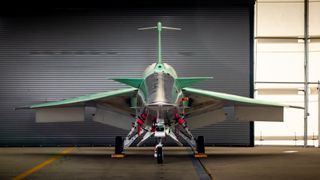Home
News
Tech

A head-on view of the X-59 supersonic plane, as engineers prepare for ground and initial flight tests at Lockheed Martin’s Skunk Works facility in Palmdale, California.
(Image credit: Lockheed Martin)
NASA’s supersonic plane has moved closer to the runway in preparation for its debut flight.
New photos show the X-59 supersonic plane parked on the flight line — the space between the hangar and the runway — at Lockheed Martin’s Skunk Works facility in Palmdale, California. The plane was moved from its construction site to the flight line on June 19, according to a statement from NASA.
This milestone kicks off a series of ground tests to ensure the X-59 is safe and ready to fly as part of NASA’s Quesst mission, which aims to demonstrate that the aircraft can fly faster than the speed of sound (or Mach 1) without generating the loud sonic booms generally produced by supersonic planes.
Related: Watch NASA’s supersonic X-59 jet come together in Lockheed Martin’s new video
“NASA will then fly the X-59 over several communities to gather data on human responses to the sound generated during supersonic flight,” officials said in the statement from the space agency. “NASA will deliver that data set to U.S. and international regulators to possibly enable commercial supersonic flight over land.”

Technicians check out the X-59 aircraft as it sits near the runway at Lockheed Martin Skunk Works in Palmdale, California, on June 19, 2023. (Image credit: Lockheed Martin)
The X-59 supersonic jet is expected to produce only a gentle thump, or the equivalent of a nearby car door slamming, for people on the ground. In comparison, previous generations of supersonic aircraft are known to rattle windows when flying over the speed of sound.

(Image credit: Lockheed Martin)
Therefore, the X-59 could lead to new sound-based rules regarding supersonic flight over land, opening new doors for faster commercial cargo and passenger air travel.

A head-on view of the X-59 supersonic plane, as engineers prepare for ground and initial flight tests at Lockheed Martin’s Skunk Works facility in Palmdale, California. (Image credit: Lockheed Martin)
The plane will remain parked near the runway during its ground and initial flight tests by Lockheed Martin. The 99.7-foot-long, 29.5-foot-wide aircraft is powered by a single jet engine, which was built by General Electric Aviation, a subsidiary of General Electric. It is designed to reach a speed of Mach 1.4, or 925 mph, flying at an altitude of 55,000 feet (16,764 meters).
If all goes according to plan, the X-59 will fly over select U.S. cities starting in 2024. Residents will be able to share their responses to the sound produced by the X-59 aircraft. Then, data collected from the flights will be shared with American and international regulators in 2027, when the Quesst mission comes to a close.
Join our Space Forums to keep talking space on the latest missions, night sky and more! And if you have a news tip, correction or comment, let us know at: [email protected].
Breaking space news, the latest updates on rocket launches, skywatching events and more!
Samantha Mathewson joined Space.com as an intern in the summer of 2016. She received a B.A. in Journalism and Environmental Science at the University of New Haven, in Connecticut. Previously, her work has been published in Nature World News. When not writing or reading about science, Samantha enjoys traveling to new places and taking photos! You can follow her on Twitter @Sam_Ashley13.
>>> Read full article>>>
Copyright for syndicated content belongs to the linked Source : Space.com – https://www.space.com/nasa-x-59-quiet-supersonic-jet-photos










